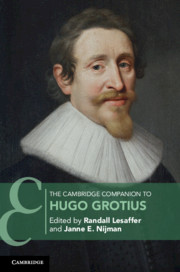Book contents
- The Cambridge Companion to Hugo Grotius
- Cambridge Companions to Law
- The Cambridge Companion to Hugo Grotius
- Copyright page
- Contents
- Contributors
- Preface
- Chronology
- Abbreviations and Short Titles of Works by Grotius
- Editions and Translations of Grotius’ Work
- Introduction
- Part I Grotius in Context
- Part II Concepts
- 4 Virtue
- 5 Trust (Fides)
- 6 Natural Law as True Law
- 7 Sociability
- 8 Sovereignty
- 9 Church and State
- 10 Predestination
- 11 Rights (I)
- 12 Rights (II)
- 13 Property, Trade and Empire
- Part III Grotius as a Man of Letters, Theologian and Political Writer
- Part IV Grotius as a Legal Scholar
- Part V The Reception of Grotius
- Index
- References
11 - Rights (I)
from Part II - Concepts
Published online by Cambridge University Press: 03 September 2021
- The Cambridge Companion to Hugo Grotius
- Cambridge Companions to Law
- The Cambridge Companion to Hugo Grotius
- Copyright page
- Contents
- Contributors
- Preface
- Chronology
- Abbreviations and Short Titles of Works by Grotius
- Editions and Translations of Grotius’ Work
- Introduction
- Part I Grotius in Context
- Part II Concepts
- 4 Virtue
- 5 Trust (Fides)
- 6 Natural Law as True Law
- 7 Sociability
- 8 Sovereignty
- 9 Church and State
- 10 Predestination
- 11 Rights (I)
- 12 Rights (II)
- 13 Property, Trade and Empire
- Part III Grotius as a Man of Letters, Theologian and Political Writer
- Part IV Grotius as a Legal Scholar
- Part V The Reception of Grotius
- Index
- References
Summary
What is the legacy of Grotius’ doctrinal efforts, and how did they impact on current structures of international law? Was he providing a natural law foundation for the global order, or rather an instrument of power for sovereigns to assert their political and commercial dominion over the world?
Keywords
- Type
- Chapter
- Information
- The Cambridge Companion to Hugo Grotius , pp. 243 - 258Publisher: Cambridge University PressPrint publication year: 2021
References
Further Reading
- 2
- Cited by

